The Assessment Knowledge Base is continuously being improved and expanded. Knowledge Base News is updated every release with information on new articles, edits to existing articles, Trainer-led video content, and more! Learn more about new knowledge base content by reading Knowledge Base News.
Release Timeline
Aug 5, 2025: Released to training sites
Sept 2025: Released to production sites
Learn more about release enhancements by watching the
Assessment Manager
The Assessment Manager has been updated with an improved user interface. Search functionality is available, and by clicking the Filters option, specific filters can be applied (1). Clicking an assessment name (2) will display the Assessment Homepage. The Assessment Manager can be exported to CSV format by expanding the export kebab menu (4). Learn more about the Assessment Manager.

Badge Manager
The Badge Manager has been updated with an improved user interface. Search functionality is available, and by clicking the Filters option, specific filters can be applied (1). By expanding the kebab menu for a badge (2), badges can be edited or deleted; View Details can be clicked to view badge information, including mapped courses, assertions, and more. The Badge Manager can be exported to CSV format by expanding the export kebab menu (4). Learn more about the Badge Manager.
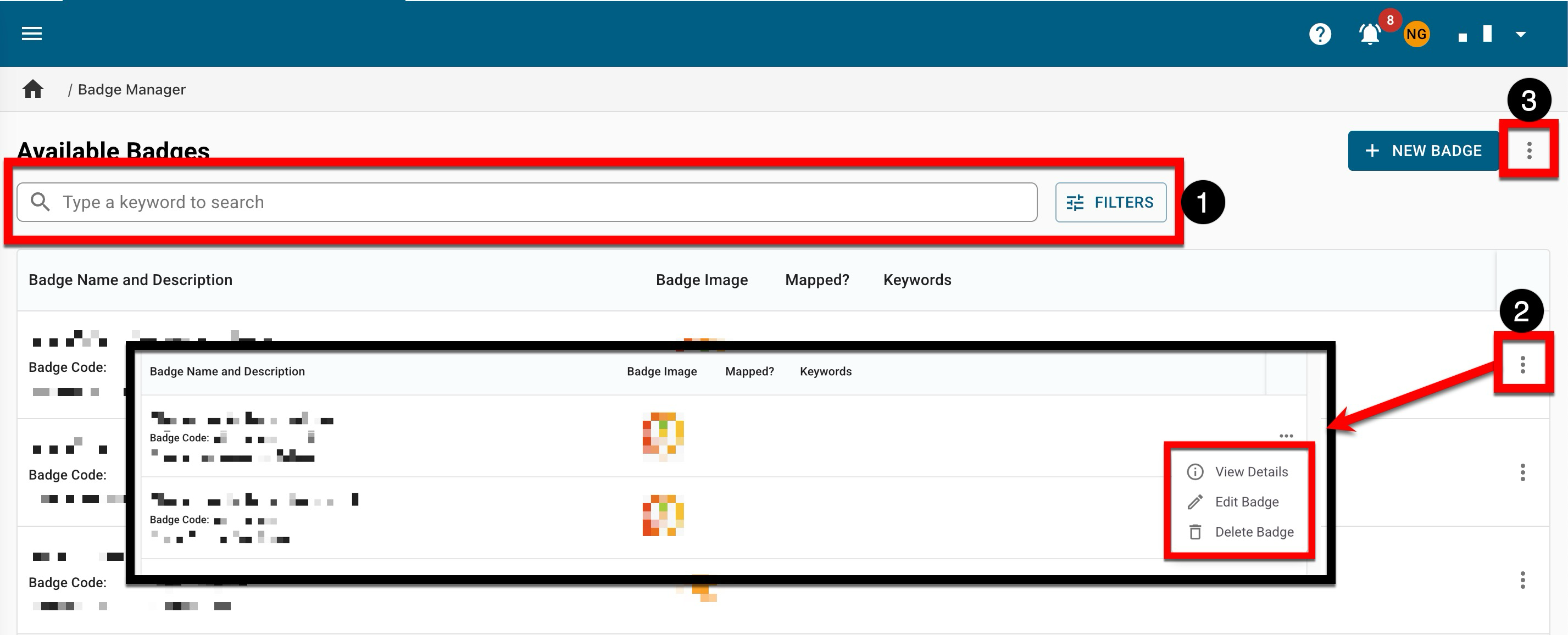
Bulk Publishing Courses
The bulk publish functionality for courses has been expanded to support both Draft and In Revision courses (1). This enhancement includes an updated course selection interface and enhanced search capabilities. This streamlined publishing workflow includes a dedicated dialog for in-revision courses and the option to override syllabus default requirements, as well as manage associated course sections and data collections. This enhancement provides greater flexibility in managing course updates, particularly when working with bulk course learning outcome imports that place multiple courses into revision status.
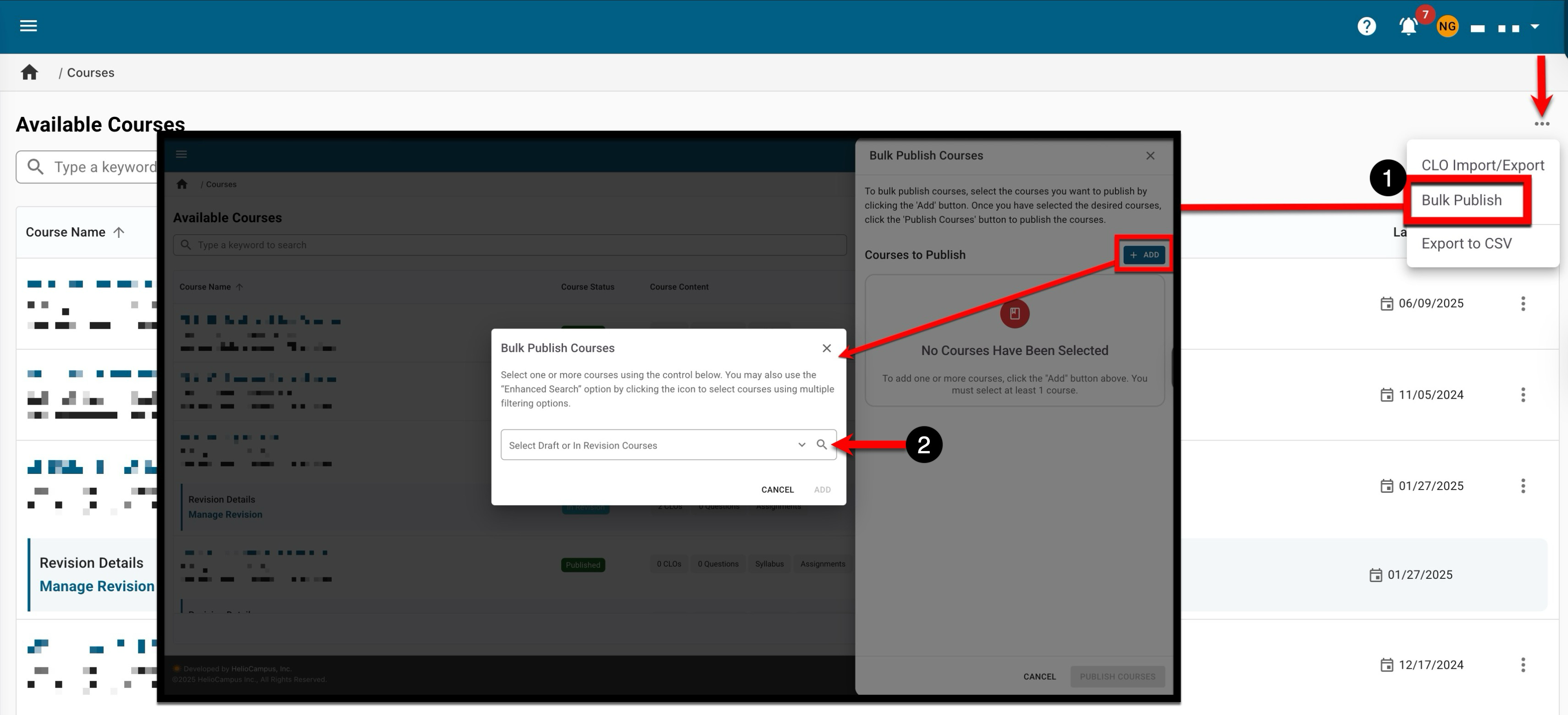
Additionally, a new select all feature has been added to the enhanced search when bulk publishing courses (2). With this new functionality, users can select all search results, even those not currently displayed on the screen, without needing to load each row manually. This improvement significantly streamlines bulk actions, saving time when working with large datasets. Learn more about publishing courses in bulk.
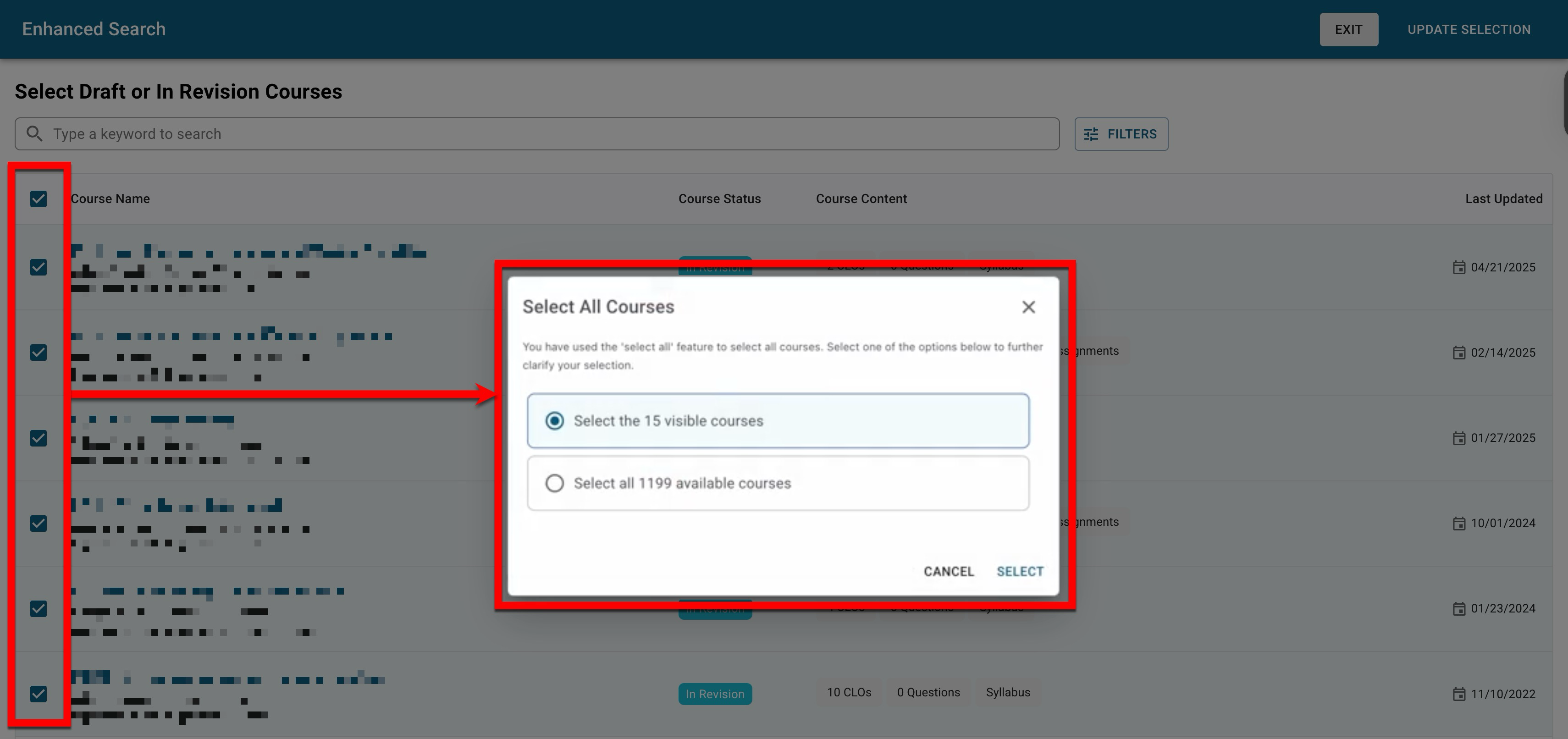
Data Collection Forms
The form completion notification for Data Collection forms has been enhanced to deliver more targeted notifications. Now, the platform will only send completion notifications for forms completed on the previous day rather than all previously completed forms. The platform uses the Daily Event Loop to identify and send notifications only for forms completed the previous day, streamlining the notification process. This improvement prevents notification overload, ensuring administrators receive only the most recent and relevant form completion information. Learn more about Data Collection.
Data Collection Manager
The Data Collection Manager has been updated with an improved user interface. Search functionality is available, and by clicking the Filters option, specific filters can be applied (1). Clicking a data collection name (2) will display the Data Collection Homepage. The Data Collection Manager can be exported to CSV format by expanding the export kebab menu (4). Learn more about the Data Collection Manager.
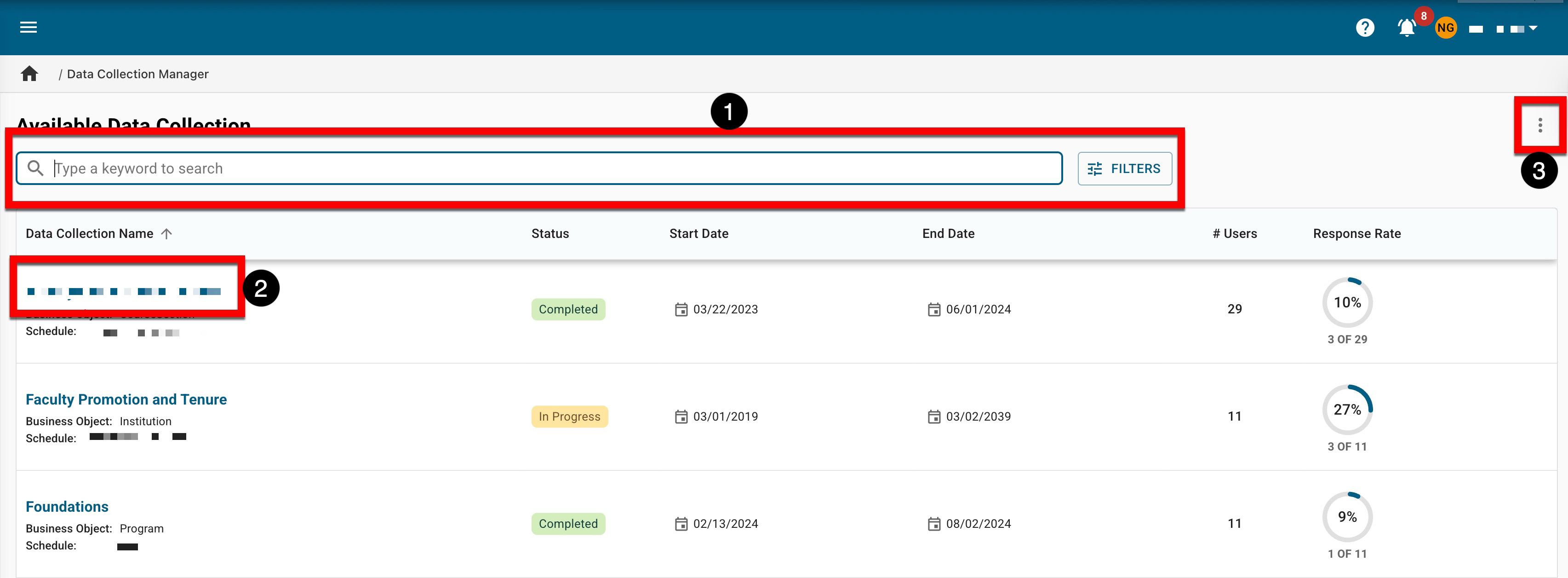
Data Files
A new optional Status column has been added to Student, Faculty, and Staff SFTP files. This enhancement allows administrators to specify user account statuses (active/inactive) during imports, providing more control over user account management.
If either ‘active’ or ‘inactive’ is provided in the Status column, upon import, HelioCampus will import the user account as a new user with the provided status or update the existing user account to the provided status. If multiple records exist for a user, HelioCampus will reference the last processed account (i.e., if there are four records for John Smith, the 4th record will be the affected account). Learn more about data files or user accounts.
Dynamic Text
The dynamic text variable format for data collection emails has been enhanced to display in a cleaner, more user-friendly format. Previously, the {{Business Object}} variable would populate in the format ‘Object Name (Object Type)’ (e.g., ‘BS Biology (Program)’). With this improvement, it will now display as ‘Object Name’ (e.g., ‘BS Biology’). The simplified format provides cleaner, more concise email communications for your users. This enhancement applies to all email types within data collections that use the following dynamic text variables:
-
Business Object
-
Business Object List
-
Form URL
-
Form URL List
Learn more about dynamic text.
Evidence Bank Export
All available criteria from a standard set will now be included when exporting the standards template. Learn more about the Standards Library or the Standard Designer.
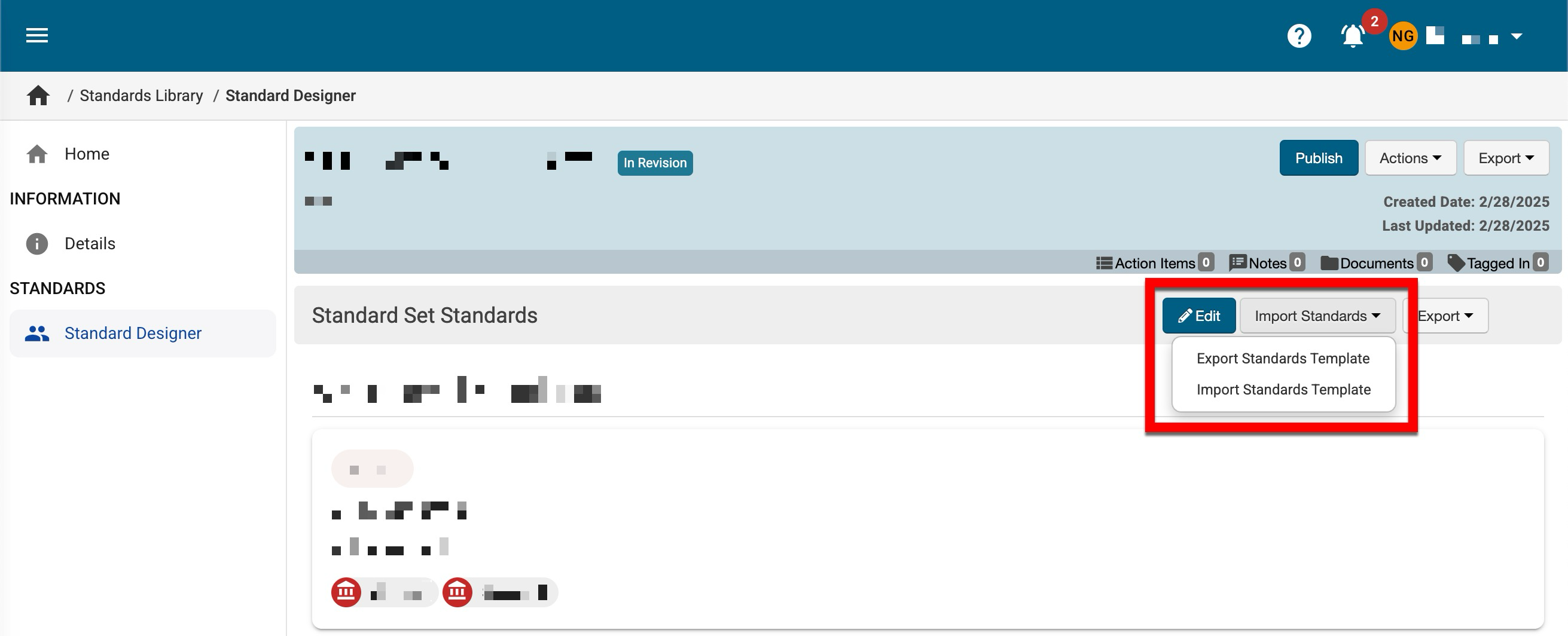
Import Error Notifications
The Import Error Email Notifications have been enhanced to include the file name in the notification body. This enhancement makes it easier for administrators to identify which specific file caused an error during the import process, improving troubleshooting efficiency. Learn more about import error notifications.
Juried Assessment
HelioCampus is pleased to announce the release of Juried Assessment, a formal evaluation process in which experts, typically faculty members or professionals, assess student work based on established rubric criteria. The assessment type focuses on aggregate student performance rather than individual submissions. For example, a Juried Assessment might reveal that math majors consistently struggle with writing skills, or that students across specific courses show weak critical thinking abilities. This approach helps institutions identify systemic skill gaps and improve curriculum design rather than just evaluating individual student work. This new feature is particularly valuable for:
-
General Education Assessment: Evaluating student mastery across core subjects.
-
Academic Program Assessment: Evaluating program effectiveness and meeting accreditation requirements through a comprehensive student work review.
Juried Assessment involves evaluating a student’s work, such as an essay, project, or presentation, by a panel of assessors knowledgeable in the field. The assessors then provide feedback and a score based on the quality and depth of the work submitted. Juried Assessments are double-blind to ensure student anonymity during assessor review and scoring. The score can be used to determine whether the Student has achieved a certain level of proficiency or mastery in the subject being assessed.
Juried Assessment is enabled for programs via Program Settings, and once enabled, Juried Assessments are created and managed via the Assessment Manager. Learn more about the new Juried Assessment feature!
The Learning Journey
HelioCampus is excited to introduce the Learning Journey, a new digital record that helps students showcase the knowledge and skills they’ve gained throughout their education. For colleges and universities that need to provide their students with an alternative to a traditional transcript, the Learning Journey is a data-informed digital record built to empower students to track and communicate the knowledge and skills they have attained. Unlike traditional transcripts that document completion of the course curriculum, the Learning Journey surfaces the transferable skills a student has mastered during their course of study. Furthermore, it allows students to author their journey through the curation of a story. Learn more about the Learning Journey.
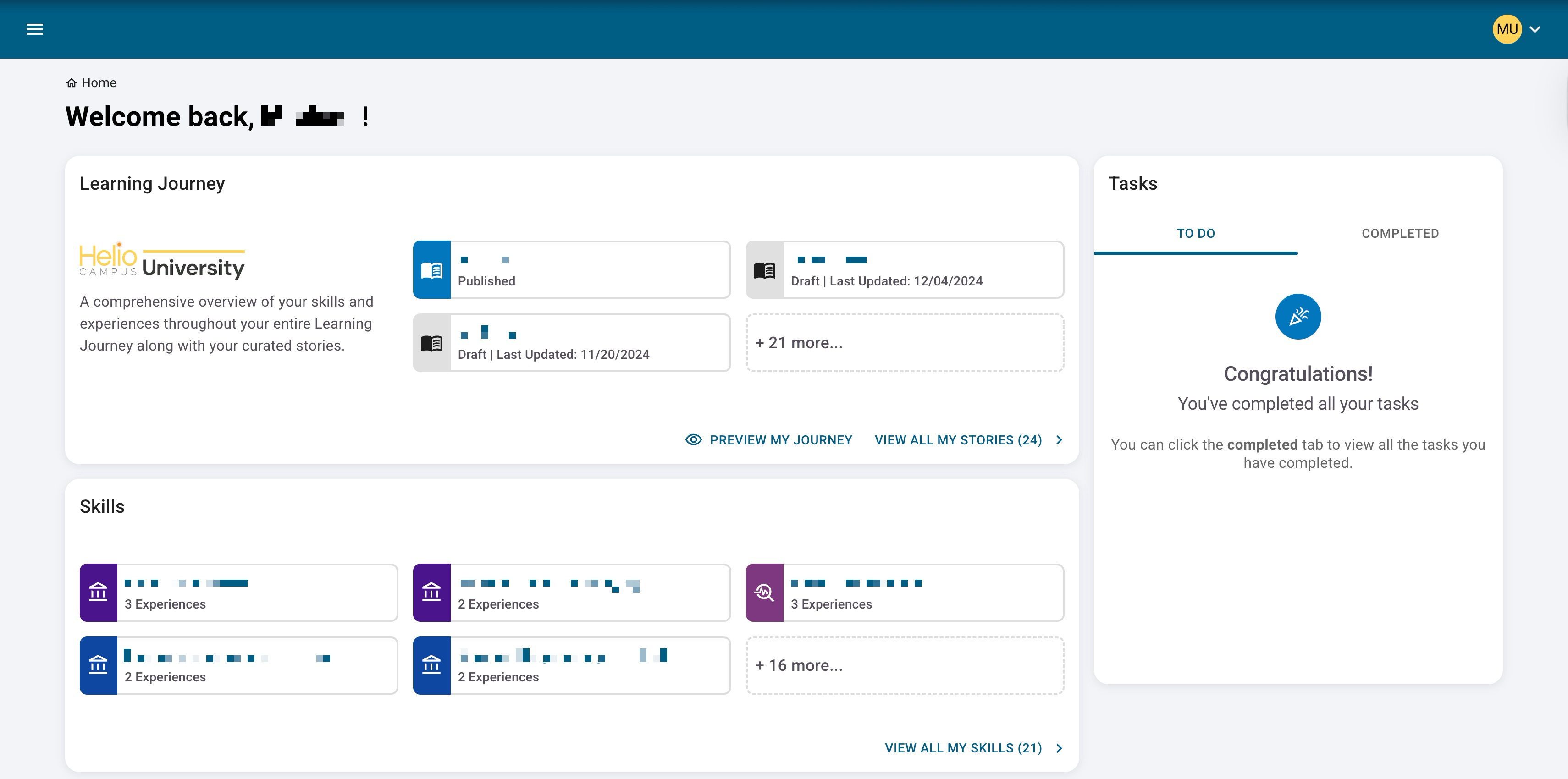
Outcomes Library
The Outcome Sets Manager has been updated with an improved user interface. Search functionality is available, and by clicking the Filters option, specific filters can be applied (1). Clicking an outcome sets name (2) will display the Outcome Set Homepage. By expanding the kebab menu for an outcome set (3) and selecting View Details, a drawer will open to display quick glance information, including the owner, related student outcomes, associated program, and more. The Outcome Sets Manager can be exported to CSV format by expanding the export kebab menu (4). Learn more about the Outcomes Library.
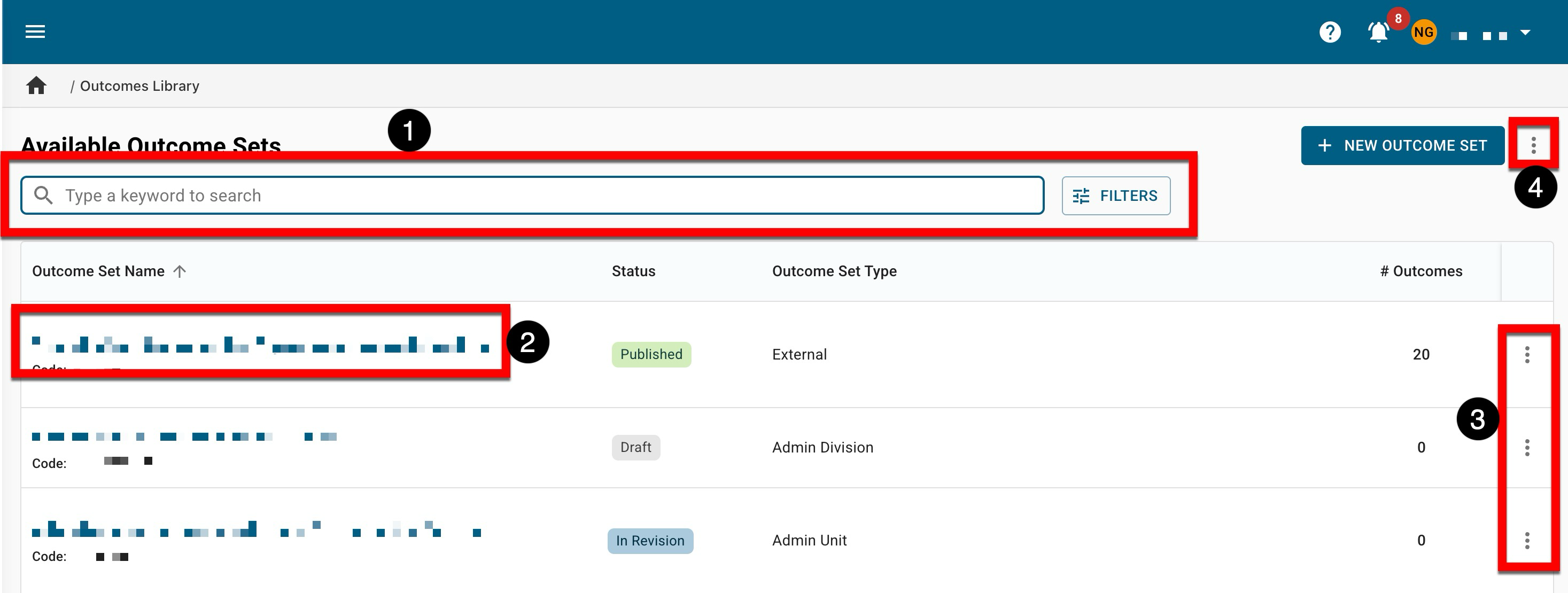
Program Manager
The Program Manager CSV export has been enhanced to support published and in-revision program versions. When filtering by status in the Program Manager, the CSV export will now accurately reflect the user interface and will include both published and associated in-revision versions.
This improvement ensures greater consistency between what is seen on screen and what is received in exported data, making it easier to track and manage program modifications across different statuses.
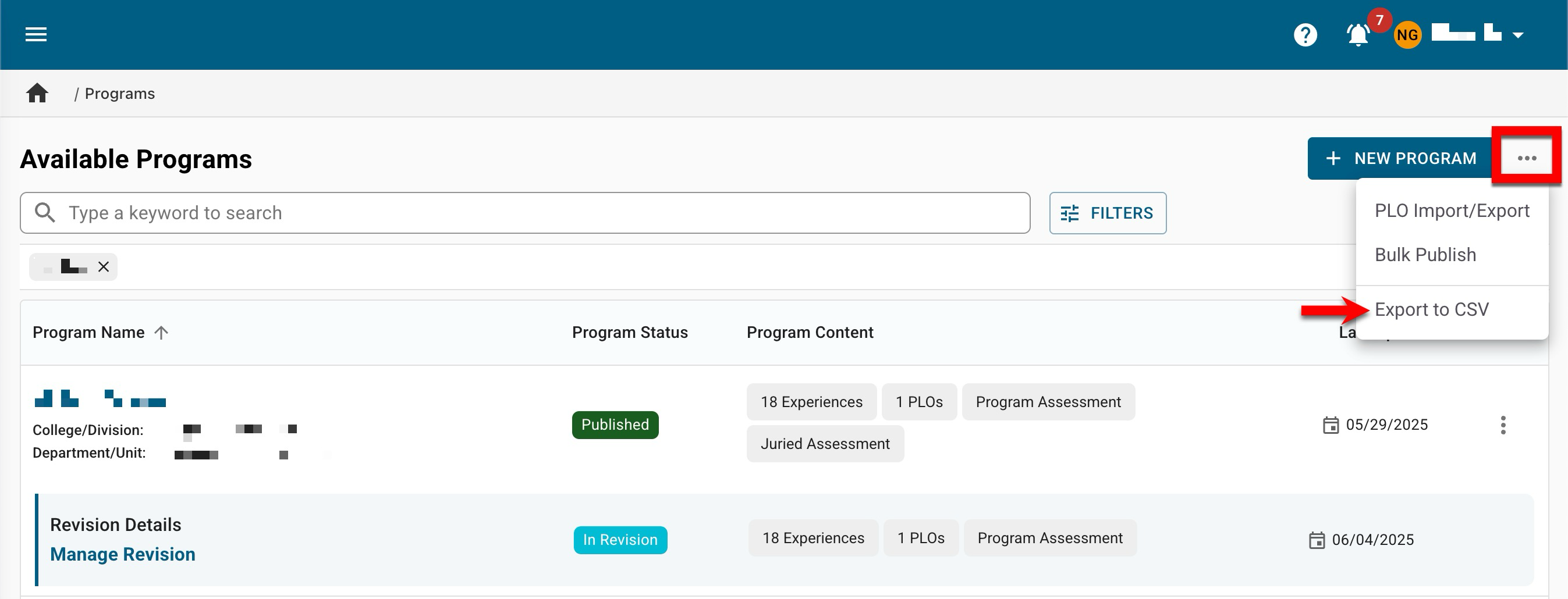
The details drawer of the Program Manager now displays the Program Coordinator. This addition enabled the display of the Program Coordinator’s name and email. Learn more about the Program Manager.
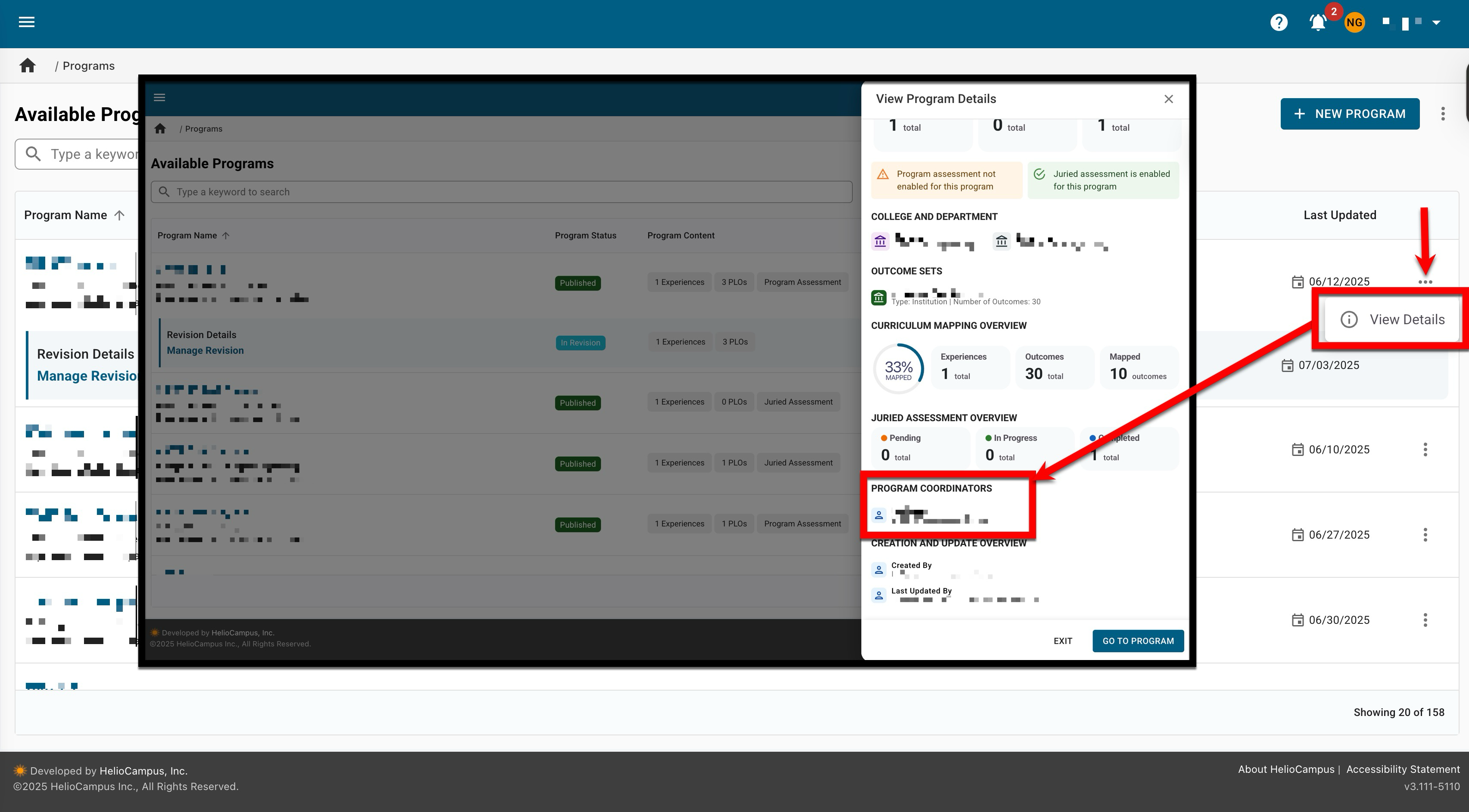
Report Library
To resolve inconsistencies between the report interface and exports, several report titles have been updated.
|
Previous Title |
New Title |
|---|---|
|
Student Course Evaluation Results by Instructor Report |
Student Course Evaluation Results by Instructor |
|
Assignment Analysis Report |
Assignment Linking Audit |
|
Assignment Analysis Results Report |
Assignment Linking Results |
|
Outcome Assessment Summary Report |
Outcome Assessment Summary |
|
Student Interest Summary Report |
Student Interest Summary |
|
Faculty Portfolio Report |
Faculty Portfolio Entries |
|
Annual Assessment and Planning Reports |
Annual Planning and Reporting |
|
Data Collection Form Status Report |
Data Collection Form Status |
Additionally, when saving reports, the original report name will now display below the title configured when the report was saved. Learn more about the Report Library.

Self Study Evidence Usage Report
The Evidence Usage Report accessed via the Related Documentation page of a self study has been improved with new columns to help users better track and manage their evidence. The report now includes:
-
From Library: Indicates whether evidence was sourced from the evidence bank.
-
Version: Displays the version number of each piece of evidence.
-
Sections: Lists the specific self study sections where each piece of evidence has been used.
These enhancements provide greater visibility into evidence usage across self studies, making it easier to track where evidence appears and which versions are being referenced. Learn more about the Related Documentation page.
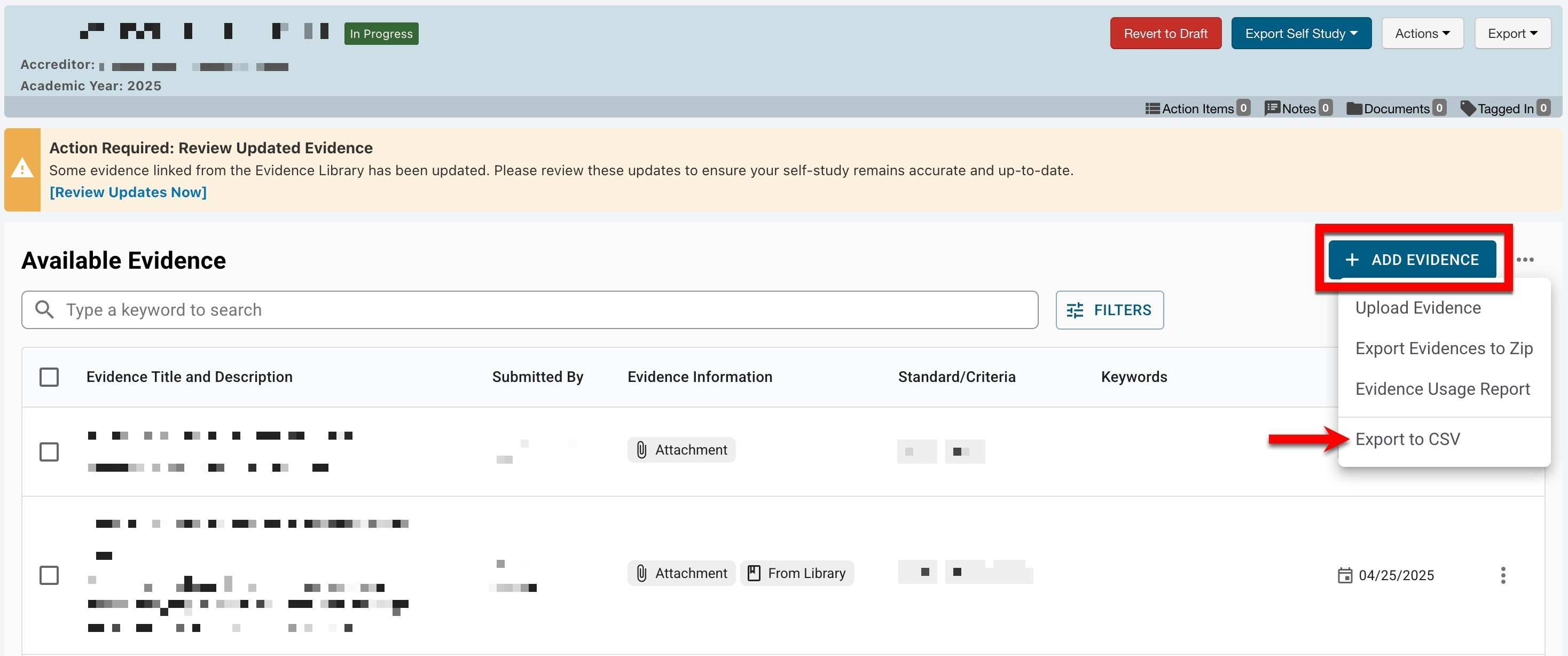
Self Study Sections
The Copy Content functionality for self study sections has been enhanced and now automatically includes all linked evidence that was inserted in the original section. This improvement ensures that:
-
All inserted evidence is copied correctly along with the text content.
-
Copied evidence will function as if it were inserted directly, meaning it can be previewed, downloaded, and removed.
-
Criteria tags for evidence are automatically updated to match the destination section’s designation. For example, evidence tagged with S1 from source self study gets copied into a self study section that is associated with criteria S5, then the evidence will automatically get updated to be tagged with S5.
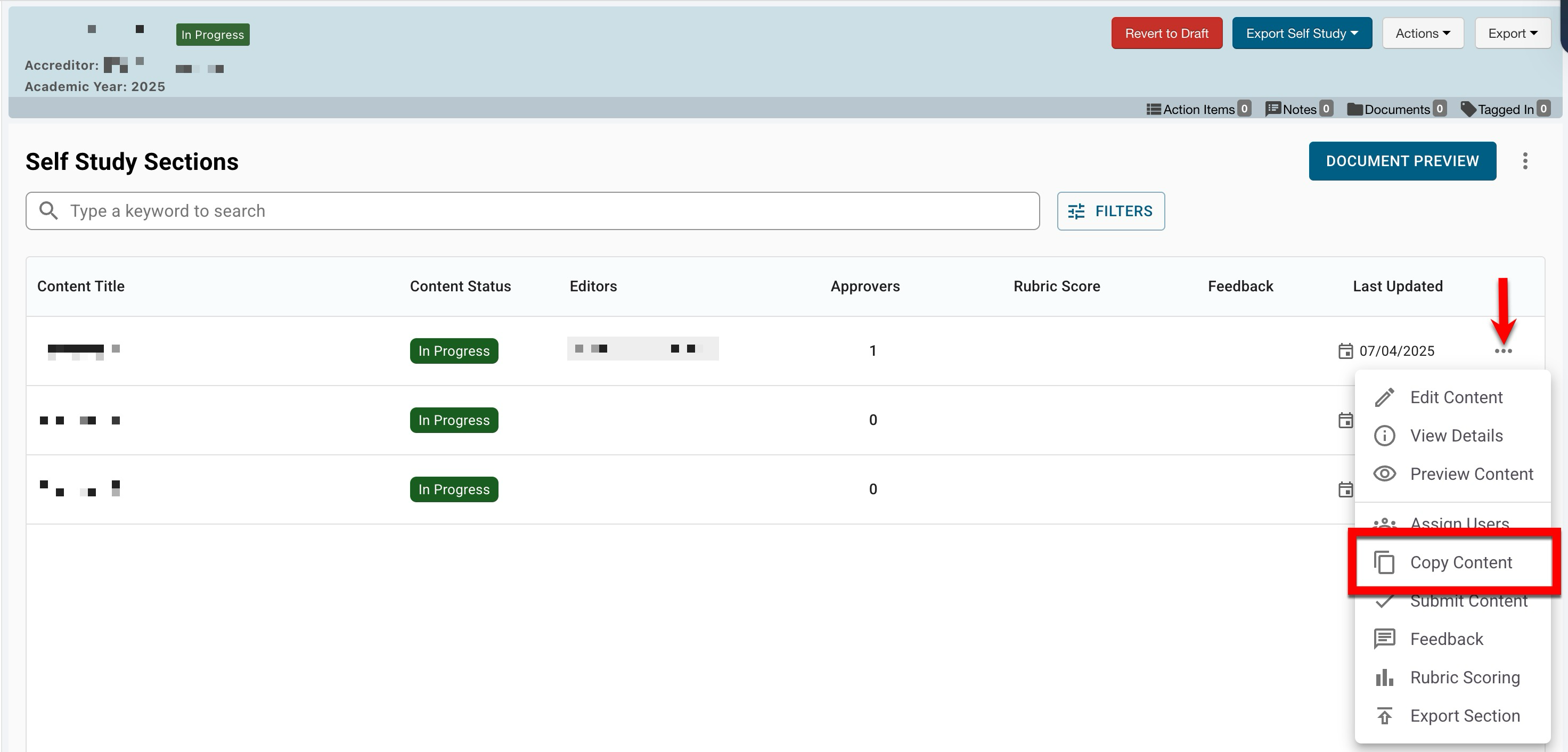
This enhancement streamlines the self study creation process by eliminating the need to manually re-add evidence after copying content between sections. Learn more about Self Study Sections.
Standards Library
The Standards Library has been updated with an improved user interface. Search functionality is available, and by clicking the Filters option, specific filters can be applied (1). Clicking a standards name (2) will display the Standard Set Homepage. By expanding the kebab menu for a standard set (3) and selecting View Details, a drawer will open to display quick glance information, including the description, owner, related standards, and more. The Standards Library can be exported to CSV format by expanding the export kebab menu (4). Learn more about the Standards Library.

Syllabus Template Manager
The Syllabus Template Manager has been updated with an improved user interface. Search functionality is available, and by clicking the Filters option, specific filters can be applied (1). Clicking a template name (2) will display the Syllabus Template Homepage. The Syllabus Template Manager can be exported to CSV format by expanding the export kebab menu (4). Learn more about the Syllabus Template Manager.
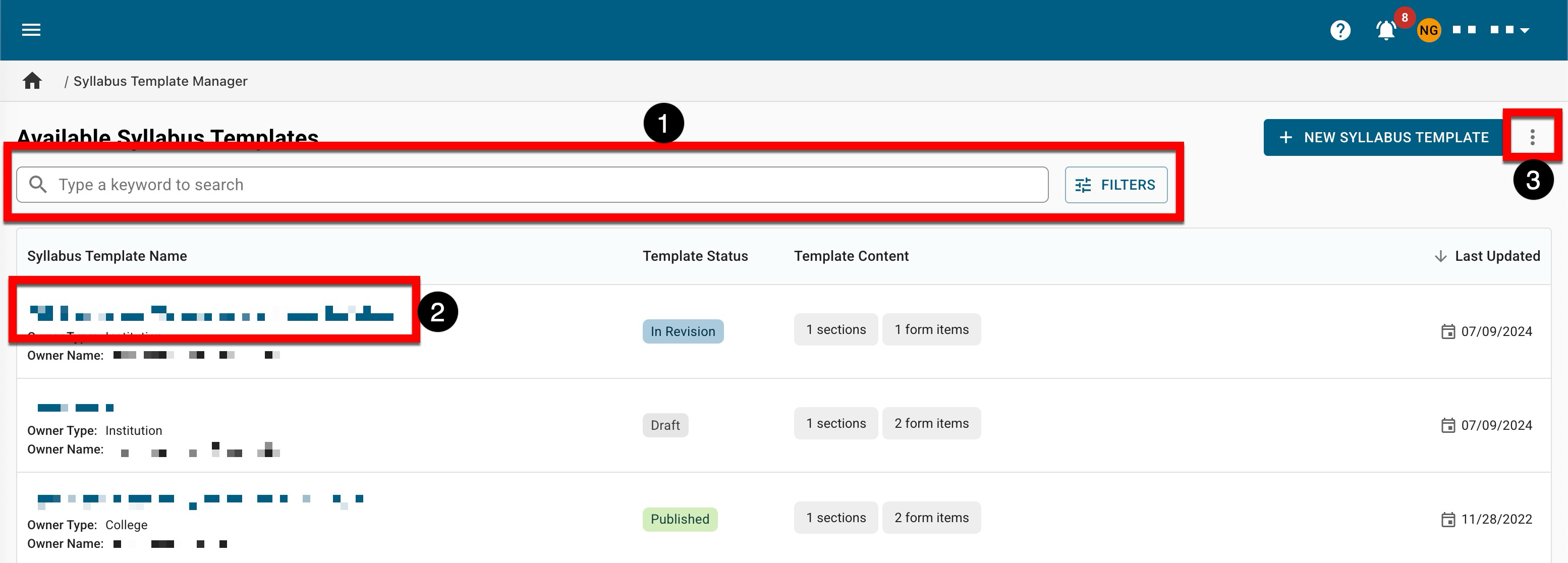
Terms
A new interface is now available when updating term statuses. This enhancement improves the user experience and clarifies the downstream impacts of the term status update process. Learn more about terms.
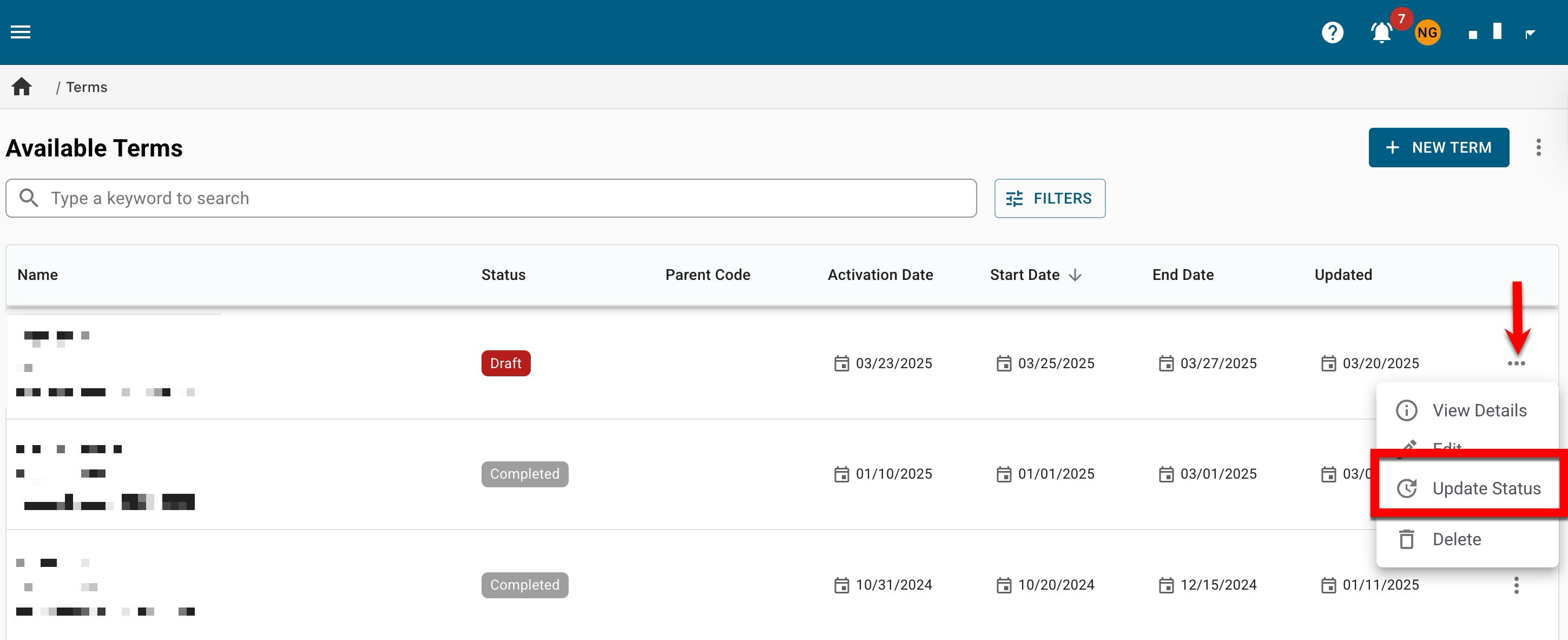
|
Status |
Status Update Result |
|
Draft |
Upon confirmation, the status will be updated to Pending. Limited editing of term timeline dates that have not yet passed will still be available until the activation date. |
|
Pending |
Upon confirmation, the status will be updated to Active. This will initiate the generation of new assessments, data collections, surveys, and automatically copy data from previous course/co-curricular sections, such as the assignment linking and syllabus details. |
|
In Progress |
The term will not change status, although it can be extended with the entry of a new, not yet passed, end date for the term. |
|
Completed |
Updating the status of a completed term will reopen the term and change the status to In Progress. The entry of a new, not yet passed, end date for the term must be entered. Once updated to In Progress, surveys, data collections, and assessments can be created with an association to the term. Associated course sections can also now be edited while the term is in progress. |
